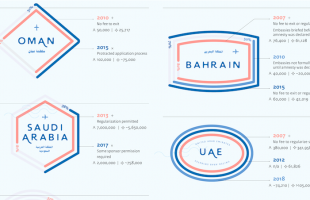Migrant advocates and human rights organizations have long condemned the inherently exploitative sponsorship (kafala) system that defines the employer-employee relationship in countries throughout the Middle East. While each country enforces slight variations of the system, the structure and the effect are the same: migrant workers are unfairly bound to the whims of their employers, who largely control their ability to travel, their legal residence, and their prospects for alternate employment. The system is antithetical to the concept of migrant rights, and to the even more basic standards of labor equality.
As follows, Saudi’s recent consideration of the sponsorship system arouses inescapable, and acutely cautious, hope. In a nation with one of the worst records for migrant rights, the announcement that the system is even under the Labor ministry’s review is reason enough to inspire some optimism. The ministry introduced the suggestion following the completion of a five-year study on the prospects of eliminating the kafala system. In its place, the study examined the potential to institute recruitment companies. A commission based in Riyadh would command the new network, and remove some of the most employer-centric features of the sponsorship system, including the ability to withhold passports or deny workers’ family eligibility to live in Saudi. More details of study’s proposal can be found here.
However, it’s important to note that no matter the system, regulation by both countries is necessary to ensure the equitable treatment of employers and employees. The exploitative conduct of present recruitment agencies illustrates the existence of migrant abuse even before the sponsorship system comes into play. Furthermore, the social marginalization and degradation of migrants must also be confronted by the state and civil society. The social conceptions of migrants are not entirely independent of their legal identities, but they do influence the treatment of migrants in their own right.
Both migrant-sending and receiving nations regularly pose reforms that fail to manifest into law, but we can hope that the study’s conclusions will be recognized by the Saudi government, and will be the precipitant of some sort of change in the kingdom. And if the alternative to the sponsorship system proves successful, other nations may soon follow suit.




